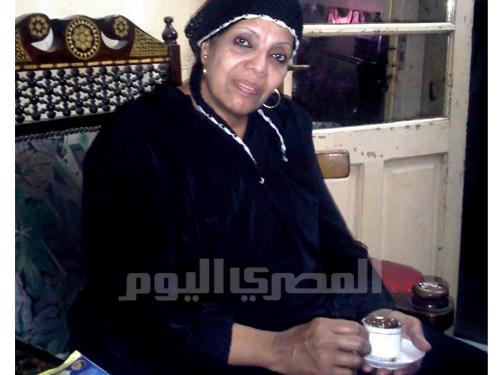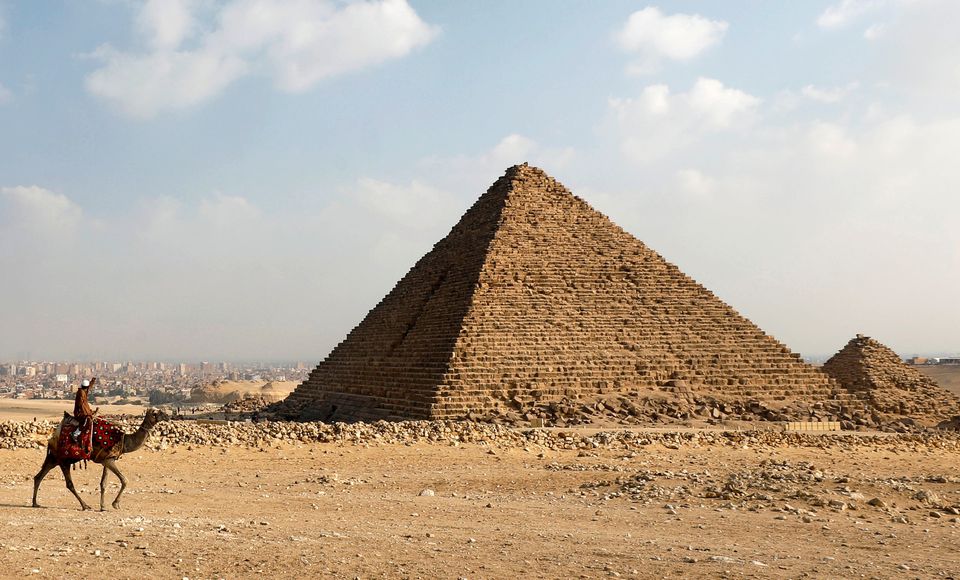
Egypt is a massive living organism — a web of ticking clocks, each set to a slightly different millisecond. With approximately 80 million in the country, 18 million of whom are woven into the streets and buildings of Cairo, the traffic of the city may crawl but many would say it is only by the will of God that it continues to flow at all. People are everywhere — driving, jumping off buses, walking, bicycling … ticking minute by minute through the days and nights of the city. Doctors, valets, belly dancers and beggars … Cairo keeps 18 million cogs in one of the world’s busiest wheels. This series takes a magnifying glass to one person, a representative of a job that keeps the city ticking — an eye-level shot that takes you through a day in the life of a cog in the wheel of Cairo. – Nevine El Shabrawy
She sits on her tiny balcony, leaning over a hedge gazing out aimlessly with a blank, yet content stare in her eyes. Madam Aida, or Om Ashraf as she is known by her neighbors, is a fortune teller or a cup reader.
“You are traveling soon,” says Om Ashraf as she expertly gazes at my cup of coffee; the norm is to place a bill of LE5 or LE10 next to the cup before the reading. “I just need a coin or two so I don’t get tired,” she says, explaining the quasi-mandatory fee.
Om Ashraf's talent is socially intelligent; she can evaluate a person just from gazing at him or her. "You are having trouble at work," she looks at me.
"Who doesn’t," I answer laughingly.
“This house is mine and my sister’s from our mother’s inheritance, God bless her soul,” says Om Ashraf, talking about her three-story house on Boktomor Street in Rod al-Farag. Om Ashraf developed her controversial talent at the age of 14, two years before she married her cousin. “My mother and my grandmother both had that talent,” she explains. Om Ashraf also says she can interpret dreams.
The spiritualist married twice and stayed with each husband for 15 years. She is a mother of seven and in her free time designs and tailors clothes for her neighbors.
Om Ashraf wakes up at dawn for the daily fagr prayer that she says she never misses; "I go back to sleep then get up at 9 am to prepare breakfast," explains the mother of seven. At noon, Om Ashraf is in her humble living room sewing the trousseau of Naglaa, a young bride-to-be from Rod el-Farag.
It is now 2 pm and building number 5 on Boktomor Street is never devoid of visitors, be they clients or neighbors who are in for a chat over coffee.
“I see images and receive thoughts,” says Om Ashraf, as she looks at the stained cup of her 28-year-old son Magdi. "Magdi wants to know when he is going to get a job," says Aida.
Magdi says he believes in his mother's talent; "She is right most of the time," he says. Madam Aida was the designated cup reader for the Le Meridien Heliopolis Hotel for several events, in addition to reading at several gatherings at the Swiss Club and other posh spots around the capital.
“I don’t make more than LE100 per day,” she confesses, claiming that her agent takes the biggest share. Om Ashraf is usually accompanied by her daughter Walaa, who draws henna.
Unlike renowned cup readers like Fadda and Warda, who works in renowned places like hotels and major restaurants such as the Marriott and Naguib Mahfouz in Hussien and charge LE50–60 per session, Om Ashraf takes whatever is offered. “I take between LE5 and LE10 and sometimes do it for free,” she says. When invited to events Om Ashraf also relies on tips from walk-ins.
“I rarely get regulars,” says Om Ashraf. She resorts to tailoring for extra income. “I also depend on my father’s pension to make ends meet.”
Cup readers in wealthy districts have word-of-mouth working for them and are known by name, unlike Om Ashraf, who lay low and depends on her neighbors and friends in Shubra.
Om Ashraf confirms that political turbulence has negatively affected tourism. Major hotels in town are suffering tremendously and hence wouldn’t invest in a regular, hotel based fortune teller for their guests and would resort in hiring one in Ramadan and Eid, which lessens her changes of making a regular income from cup reading.
“There are no clients. Life is clear in front of us now, who would need a mystic to unravel the future?” asks Om Ashraf in a sarcastic tone.
Around 6 pm, Magda walks in. “My sister lives in the opposite apartment and is usually over for dinner and another round of coffee,” says the cup reader. "My car got stolen from Ramsis last January and Aida told me I will find it and I did," says Magda. It is now Maghreb and both sister leave the room to pray. Magda reappears with a brown cotton Galabeya and gives it to me to wear.
"You pray, right?" she asks.
It is now dark; Boktomor Street is much calmer except for the laughs coming out from Aida's Apartment.
"Your partner was engaged before," says Aida; "Yes, to me" I answer and a new wave of laughter takes the tiny living room by storm. Aida waves at her son to join; Mosaad lives in the opposing building.
"I drive an ambulance," says the 48-year-old man. Mosaad also comes for a regular reading by his mom. "When I see something bad in the cup, I warn my client.
The neighborhood goes to sleep around two in the morning. Nowadays, crimes and thefts have become more frequent in Om Ashraf’s district, she says.
“I am usually in bed by 10 pm, maximum, unless I am waiting for one of the boys to come back,” says Om Ashraf.




